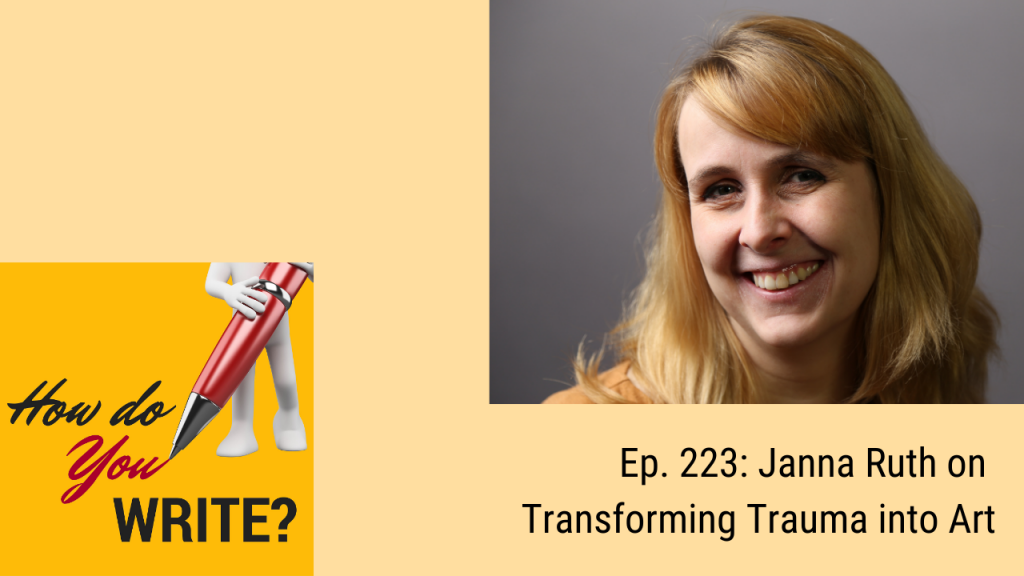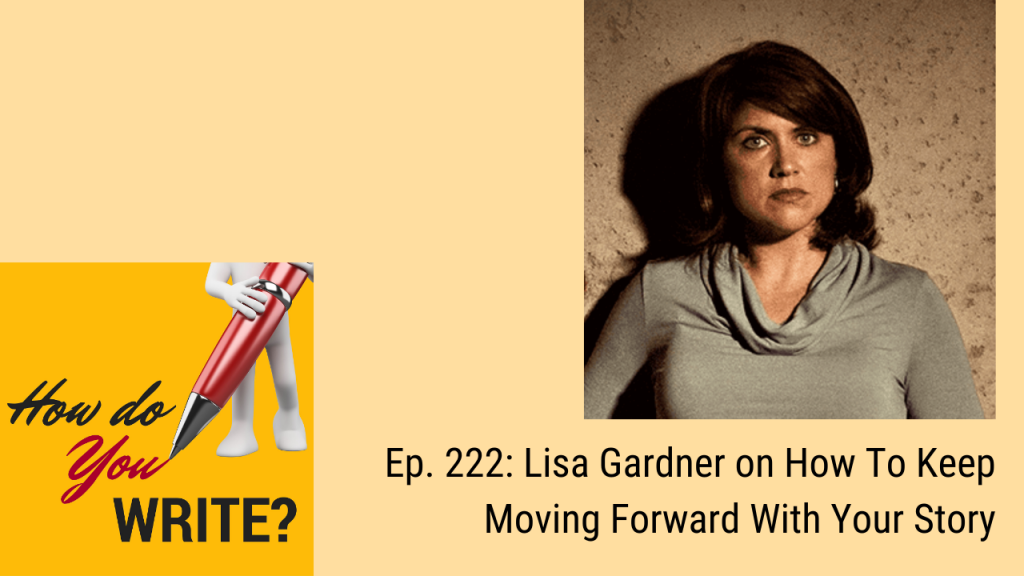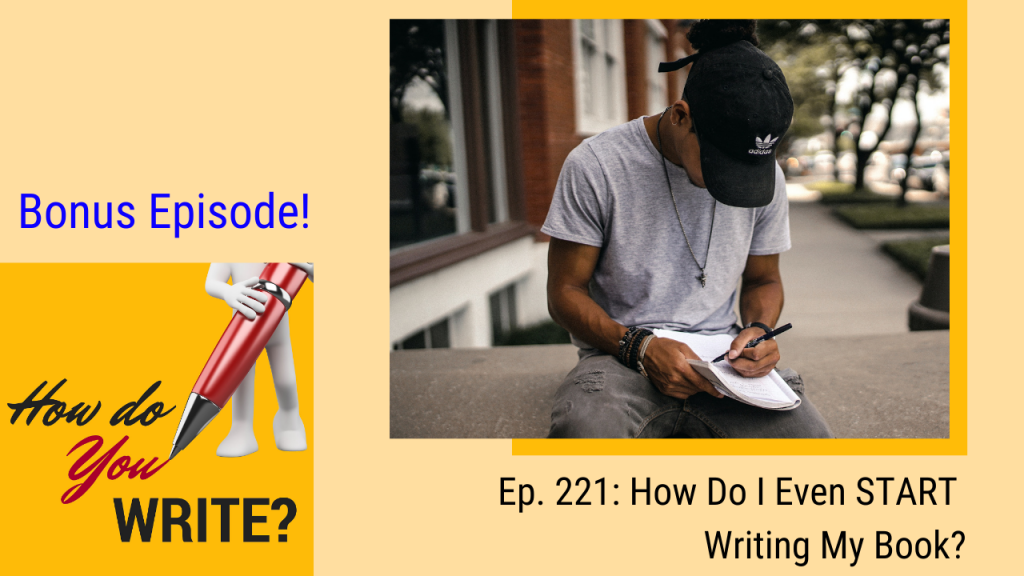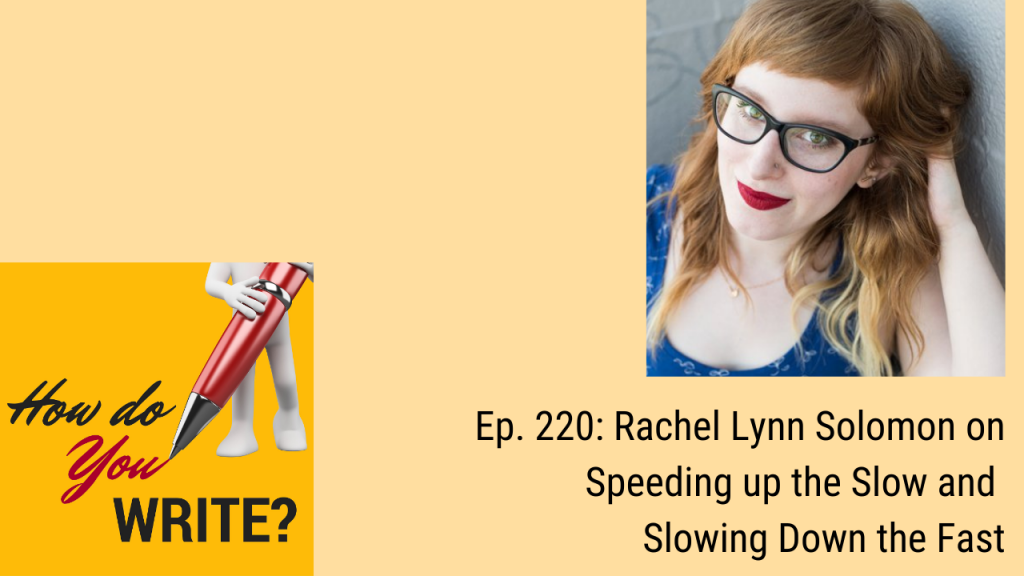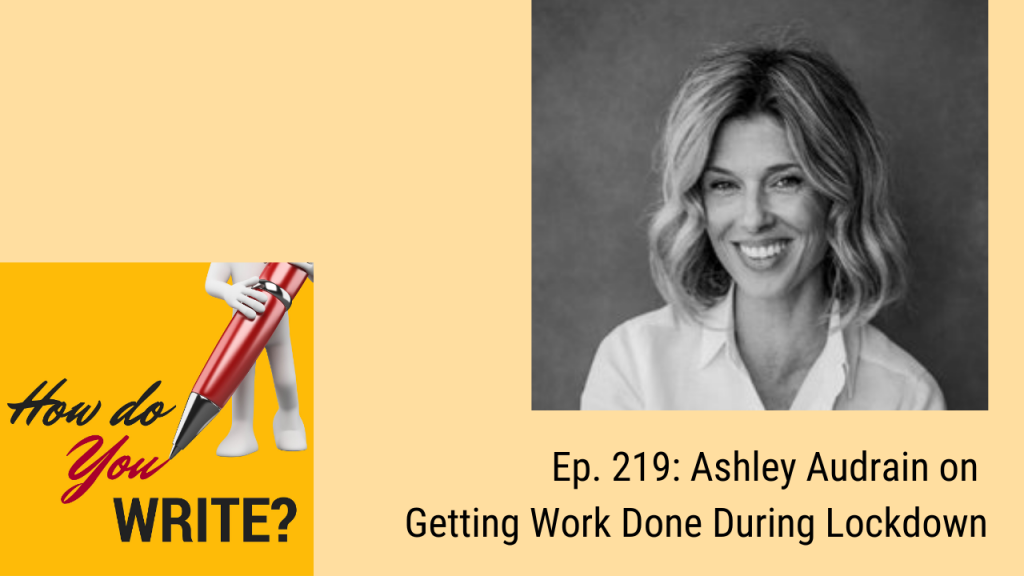How do you write dark? Like, REALLY dark? Abigail Dean tells us.
Abigail Dean works as a lawyer for Google, and before that was a bookseller. She lives in London, and is working on her second novel. Girl A is her first novel, just out in the United States after a competitive international auction that saw the book sell in 25 territories. It’s been optioned for TV rights for a limited series with Johan Renck, the Emmy winner from HBO’s critical and commercial hit “Chernobyl,” attached to direct.
How Do You Write Podcast: Explore the processes of working writers with bestselling author Rachael Herron. Want tips on how to write the book you long to finish? Here you’ll gain insight from other writers on how to get in the chair, tricks to stay in it, and inspiration to get your own words flowing.
Join Rachael’s Slack channel, Onward Writers!
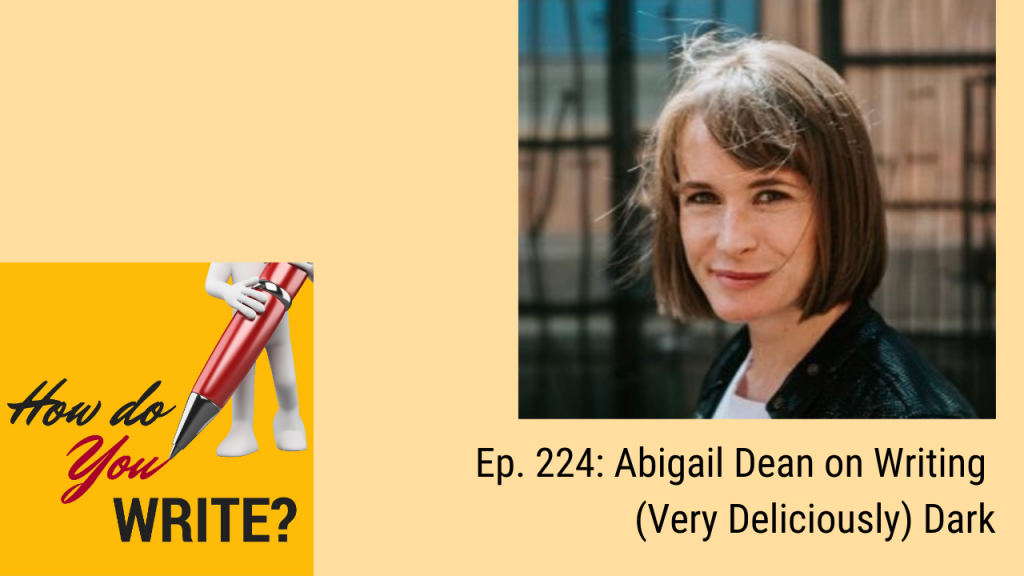
Transcript
Rachael Herron: [00:00:00] Welcome to “How do you Write?” I’m your host, Rachael Herron. On this podcast, I talk to authors about how they write, what their process is and how their lives fit together. I’ll keep each episode short so you can get back to writing.
[00:00:16] Well, Hello writers! Welcome to episode #224 of “How do you Write?” I’m Rachael Herron. And I’m so pleased that you are with me here today to talk to Abigail Dean. Y’all, this book rocked my world. This was such a great book and it was so dark and it got me really excited about reading dark again. You know, 2020 kind of took a little bit of a, you know, the glow off of darkness? Is that a thing? I’m not even going to rerecord this because you understand what I mean. Like, I didn’t really want to read that dark in 2020, but I tell you what, 2021 looking a tiny bit brighter, the tiniest and I’m back into reading dark thriller. So, I will speak to, what’s been going on around here for just a second, and then I want to go back to talking about Abigail Dean before we start talking to her. [00:01:10] So, personal update around here, I’m just chugging along. It feels really, really great, as I have said multiple times, to be well enough to be back in the chair. I am working on, it feels like a million different projects at once, but I am doing it in big chunks, according to my new schedule, which is just brilliant each day that I’m on. For example, today’s Thursday, talking Thursday. Each day that I’m on, I always decide that it’s my favorite until I get to the next day when I decide that that’s my favorite. So I think that’s a really, really great sign as to how things are going around here. I did finish the read for revision of the Quincy book and I’m plunging tomorrow into starting to write a synopsis of it, which I will use to guide our revision eventually. And I did a bunch of work on this nonfiction book yesterday. Things are just going really well. Knock all the wood that is around. 90 day classes are going great and my students are just kicking ass and they’re getting stuff done and I’m really proud about them. Proud about them? Yes. I’m proud of them as well. [00:02:18] How about you? Are you getting your work done? You are listening to this podcast because you are a writer. I know that. So, if you’re not getting any work done, try to get some done. Just a little bit crappy first drafts are what we make people. That’s what we do. They’re not going to be good. I say this all the time, because it takes a long time for this really, really to sink into people’s brains. It took me, being a professional full-time writer, for years before it sunk into my brain. Oh, that my crappy first drafts, they were never going to be good. I was never going to finally get good enough to make a good first draft. It doesn’t happen. Crappy first drafts are what we do or what 99% of writers do. So, write some crappy first draft words and then tell me about it. Okay. So we’re going to go back to talking about Abigail Dean. This book is called “Girl A” and I talked to her about the prologue, which I thought was fascinating. It’s very short. It’s one page. And I asked her permission to read this to you, and then we’re going to talk about it in the interview and you can see what she does with this, but, oh, it’s good. No spoilers. Again, this is just the first page, prologue of the book. [00:03:44] You don’t know me, but you’ll have seen my face. In the earlier pictures, they bludgeoned our features with pixels right down to our waists. Even our hair was too distinctive to disclose. But the story and his protectors grew weary. And in the danker corners of the internet, we became easy to find. The favored photograph was taken in front of the house on Moorewoods road, early on a September evening. We had filed out and lined up. Six of us, in height order and Noah in Ethan’s arms while father arranged the composition. Little white wraiths squirming in the sunshine. Behind us, the house rested in the last of the day’s light, shadows spreading from the windows and the door. We were still and looking at the camera. It should have been perfect. But just before father pressed the button, Evie squeezed my hand and turned up her face toward me. In the photograph, she’s just about to speak and my smile is starting to curl. I don’t remember what she said, but I’m quite sure that we paid for it later. [00:04:53] Oh, okay. And then the next line, that’s the prologue. The next line is I arrived at the prison in the mid afternoon. Tell me that you would not have to keep reading that. That prologue just knocked me out and I wanted to talk to her about how she came up with it, what it meant to her, how she does this. It’s one of those things that, you know, I went back to kind of take apart. There’s a “sweetness” to it, you know, a childlike sweetness at the end when she’s smiling at her sister, but there’s also that foreboding sense of menace and dread that just hangs over it. I just think she is phenomenal. So let’s leap into the podcast now and you’ll be able to hear me talk with Abigail Dean and, I think you all should read Girl A. Right, I also think you all should be doing your own writing, which is why you’re here while you’re listening. And, I know that you can do it. I know it’s hard and I know that you can do it. All right, happy writing. [00:05:59 Hey, is resistance keeping you from writing? Are you looking for an actual writing community in which you can make a calls and be held accountable for them? Join RachaelSaysWrite, like twice weekly, two hour writing session on zoom. You can bop in and out of the writing room as your schedule needs, but for just $39 a month, you can write up to 4 hours a week. With our wonderful little community, in which you’ll actually get to know your writing peers. We write from 8:00 AM to 10:00 AM on Tuesdays and 4:00 PM to 6:00 PM on Thursdays and that’s US Pacific Standard Time. Go to RachaelHerron.com/Write to find out more.Rachael Herron: [00:06:40] Well, I could not be more pleased to welcome to the show, Abigail Dean. Hello, Abigail.
Abigail Dean: [00:06:46] Hi, Rachael, thank you so much for having me on as well.
Rachael Herron: [00:06:49] I was, I was just bending your ear with what I thought about your book, but I want to talk about it a lot more today with a little intro here. Abigail Dean. Wow. I’m very excited. Abigail Dean works as a lawyer for Google, and before that was a bookseller. She lives in London, and is working on her second novel. Girl A is her first novel, just out in the United States after a competitive international auction that saw the book sell in 25 territories. It’s been optioned for TV rights for a limited series with Johan Renck, the Emmy winner from HBO’s critical and commercial hit “Chernobyl,” attached to direct. So, first of all, just, wow, flipping wow, I loved your book, couldn’t put it down, at all. How are you feeling about all of this like, sudden critical, big attention, just blowing up in your face? How does that feel?
Abigail Dean: [00:07:42] So I’m probably just going to sound completely, inarticulate. Because I, like, I don’t know really how I feel like I think I’m still in a bit of a state of shock. And you know, I think the shock is like 90% joyful and 10% terrified, I’d say. Like the best thing is, the characters being out there in the world and people getting to know the characters and, you know, as a reader like of my life, I’ve had known, I have so many relationships with so many characters, you know, you feel like I’ve loved them and I have detested them. And I think that hearing from readers that they have felt that way, about the characters, that’s the best feeling in the world. So yeah, kind of, a lot of joy, and then I think, inevitably a tiny bit of terror because there’s some exposure, of course, in terms of, you know, a small piece of your heart being out there. It’s a strange feeling as well.
Rachael Herron: [00:08:48] And Lex, the main character is so perfectly drawn. And without any spoilers, I will say that at the 25% mark, after we have, I was trying to figure it out as a writer, you know, why did we just go from first person into this third person? Why, why am I, why am I here with this male character? And then, Lex communicates with him at the very end of that scene and says, hello. And I burst into tears, at the 25% mark. Like that doesn’t ha, I don’t cry in books anyway. I just thought it was beautiful. It was beautiful. It was such. It was also such a dark book that dragged me through it. And I am a, you know, a psychological thriller junkie, I read them all. I’ve almost been feeling bored lately. I feel like I’ve seen all the angles and yours was fresh and new and beautifully, absolutely beautifully written. The way that you write characters is stunning. But what I wanted to talk about real quickly first is just before in the intro, I will have read the very short prologue to your book. And I wanted to read it because I think it is an absolutely brilliant way of capturing the reader’s attention and giving them just enough information to peak their interest in a way that is, it is absolutely impossible not to turn the next page because we must know more. And this is a very technical question, only the writers will be interested in it, but at what point did that scene arise? Either being written or when you knew it was the start of the book?
Abigail Dean: [00:10:21] It was there from the beginning. It was like the first scene written.
Rachael Herron: [00:10:26] Holy crap.
Abigail Dean: [00:10:26] Yeah.
Rachael Herron: [00:10:27] I was sure you would say like, no, that was impossible to come to. That’s amazing.
Abigail Dean: [00:10:33] I think that what the reason, like the reason behind it was, I am a true crime junkie, you know. I’m like, I’ve listened to the podcasts, I’ve watched the TV shows. And I, you know, I think often in these cases there is this defining photograph or this defining image. And that’s how you know, that the people who were involved in that, in that instance, that’s kind of what these human beings, I think, sometimes are almost like reduced to and compacted into like these images that we kind of remember for years after. And I think in a way I wanted it to be like, sometimes that’s the end of the story, and that’s all you, that’s all you get. But in a way for, yeah, so for Girl A, I was, I wanted that to be the beginning of the story and then, everything that comes after the, you know, the rest of the novel is how the Gracie family, you know, who are they really? You know, this photo is such a, it’s defining, but at the same time, it’s completely not defining it. It’s like the tiniest tip of, of this iceberg of them, of what they’ve been through and, and the people they’ve become as well.
Rachael Herron: [00:11:53] So, okay. I love all this. So for a debut novel, did not read as a debut, it read as I, and I feel like I am, you know, covelling and waxing repsotic even too much, but it read like a masterpiece in thriller. Where is your writing history? I know you’re a lawyer, which is all writing and there are so many lawyers who then move into writing or the other way, is that part of it? Or where else do you come from in writing?
Abigail Dean: [00:12:19] So I think it’s, I’ve been writing a lot since I was really little, like really, really little. And my, my mom has recently unearthed like some fantastic line of two pages of a four stapled together, I was like, yeah, this is my serious novel and I’m six.
Rachael Herron: [00:12:36] How cute.
Abigail Dean: [00:12:37] Everyone has to read it. Yeah. It’s like, thanks mum, very much. Just what I, just I always wanted. And you know, I filled notebooks, with various stories and a lot of them were dark as well. I think, you know, in a pretty early age, I was sort of often writing once it was the soft toys. You know, basically someone’s had a bad time and then it was like the Barbies and they had a pretty bad time as well. And as a teenager, I also wrote a lot of fan fiction. Huge amounts of fan fiction.
Rachael Herron: [00:13:12] I don’t do it. That’s such a good training ground. I think.
Abigail Dean: [00:13:17] Yeah. It’s one of those strange, strange things isn’t it? I don’t know if it’s, because it’s something that, you know, teenage girls often do and sometimes people like, well, your teenage girls, what are, what do they know? You know, fan fiction has, seems to somehow have a really bad reputation, but it’s an awesome way of writing and, you know, I can’t think of a, yeah. As a writer as well, they, I can’t think of a greater compliment in a way than people wanting to make your characters their own in a particular way.
Rachael Herron: [00:13:49] What was your favorite fandom that you were writing in? If you don’t mind sharing.
Abigail Dean: [00:13:52] No, that’s okay. I am. So I was a big gamer and I wrote a lot of like final fantasy. Fantasy seven and eight was my, was my light fandom at the time. And I still, they were still great. They are still great stories and incredibly inspiring stories that, yeah, I still like look back and I’m like, incredible inspiration.
Rachael Herron: [00:14:15] I just absolutely love that. Okay. So what, so you’re busy, you’re a lawyer where, where, how do you get the writing done? Where does this fit into your life?
Abigail Dean: [00:14:24] So, for Girl A, I took some time off to start writing. It had been a case that in my twenties, I just, I basically just worked for at least sort of six, seven years, at that time, and I kind of didn’t write at all. You know, I would, I was doing like lawyer writing, so I was writing contracts and writing emails, many emails. But I kind of let writing slip away a little. And I was sort of coming with my 30th birthday and was like, why have you kind of abandoned this thing that you absolutely loved, you know, this long standing ambition and, and yeah. But more than ambition, I think, really just the thing that, you know, was probably for me, the most satisfying thing that I can do. So yeah, I decided to just sort of shake things up a bit and I left my job at a law firm, which we had incredibly demanding hours, lots of travel time, and spent three months, basically just sitting in my local library and, and starting to write Girl A.
Rachael Herron: [00:15:42] So it wasn’t even a, it wasn’t even a sabbatical. You, you quit, to do this?
Abigail Dean: [00:15:48] Yeah, I, I did.
Rachael Herron: [00:15:49] Wow. How did that feel?
Abigail Dean: [00:15:50] I had. So I should, I want to be totally frank. I am a risky, a risk averse, lawyer standard, and I had another job lined up at the end of the three months. So I didn’t, I didn’t kind of quit, without anything, anything waiting, but I did, I, you know, it felt. Even just having a three months where you’re unpaid and you’re like, okay, I’m gonna see how this goes. I sort of made a bit of a deal with myself that if I was going to do it, I had to actually write, you know. Like, I have as much temptation as anyone to lie in bed and read and then watch Netflix. And I was like, okay, you know, you’re taking three months off. You have to actually, show up every day, you know, it doesn’t have to be good. It doesn’t have to be, you don’t have to write X number of words a day, but you do need to show up and try and that was the deal, for that.
Rachael Herron: [00:16:49] Did you get most of the book done in that three months or was that the start of it?
Abigail Dean: [00:16:54] It was the start. I had really grand ideas, you know, I saw myself like just getting this first draft, just getting it out in three months. And, yeah, that did not happen. I got about, maybe a third to a half of the way back and then it was another nine months of evenings and weekends and just, you know, just finding time, wherever I could. Like, I’m a big, I think a lot of the time I’d been quite precious about how I wrote. And I think one of the reasons I didn’t write in my twenties was I had ideas that I needed to be sitting in silence with like, you know, writing by hand, have like hours of time. And a lot of Girl A was written, you know, I would wrote on the note section of my phone. I wrote, you know, sometimes by hand, sometimes with a laptop, like whatever was easiest. And I think I kind of had to let go of those notions that the muse was going to like, come on, find me in my bedroom because yeah, it didn’t and you know, some scenes were difficult and challenging. I didn’t want to write them, but, yeah, it was, it was a much more mundane exercise than I had allowed myself previously to think.
[Read more…] about Ep. 224: Abigail Dean on Writing (Very Deliciously) Dark